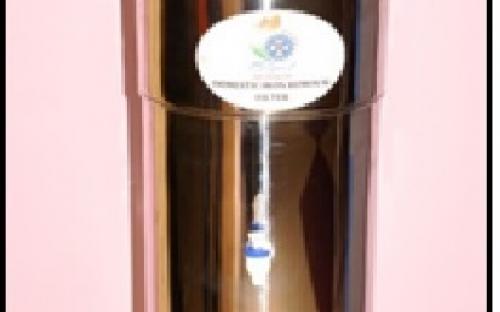Type:
Product
IPR Status:
Patent
Secured In:
India
Application/uses:
The developed Unit may be deployed in several Govt. Sectors like School, Colleges, Hospitals etc in Iron affected areas in India through different Govt./NGOs.
Salient Technical Competing Features:
- Electrical Power Free
- Chemical free: Green Technology
- Storage capacity: 16 L (approx.)
- Flow rate: 3 L/Hr. (approx.)
- Complying Drinking water Specification (IS: 10500: 2012)
- Cost of filter water: 03 paisa/L (approx.)
- Maintenance: Through washing the media [After 40 days (If, Fe concentration: 7 ppm & 10 L consumption daily)]
- Scale of Development: TRL-7
- Manufacturing Cost: Rs.1,800/- approx..
Techno Economic:
CSIR-CMERI had already deployed 20 numbers of this Unit for the rural masses in Iron affected districts in West Bengal. Since the developed filter produces iron free water at ~ 3 paisa/litre (approx.), its deployment would definitely generate livelihood.
Content Details:
Ground water is an essential component of daily life support system in India, especially in the rural areas where it is the only resource of drinking water. An excess amount of iron in the ground water which can create health and economic complications. Though iron is an essential element required for the human body system but continuous consumption of water containing excess iron may lead to stomach problems, nausea, vomiting, effects on skin, etc. High iron is associated with discoloration, turbidity and taste problems, in addition to forming slime and iron accumulation in pipes. Iron also promotes the growth of certain types of chlorine-tolerant microorganisms in water distribution systems, including organisms harmful to human health and also increases the cost of cleaning and sterilizing systems. As per WHO, the upper limit of iron in drinking water is 0.3 mg/l, but there are 297 districts of 24 Indian states having underground water contaminated by excessive concentration of iron.
 CSIR-CMERI Leads Chhattisgarh’s Green Farming Revolution with the PRIMA ET 11 e-Tractor
CSIR-CMERI Leads Chhattisgarh’s Green Farming Revolution with the PRIMA ET 11 e-Tractor  Mob Control Vehicles
Mob Control Vehicles Smart Farm Technologies
 Science Comes Alive! - Igniting Scientific Minds in Agartala # CSIR-CMERI Jigyasa Programme
Science Comes Alive! - Igniting Scientific Minds in Agartala # CSIR-CMERI Jigyasa Programme  Unveiling 'Yantrik Srijan': 3rd Issue of In-house Official Language Magazine
Unveiling 'Yantrik Srijan': 3rd Issue of In-house Official Language Magazine 







